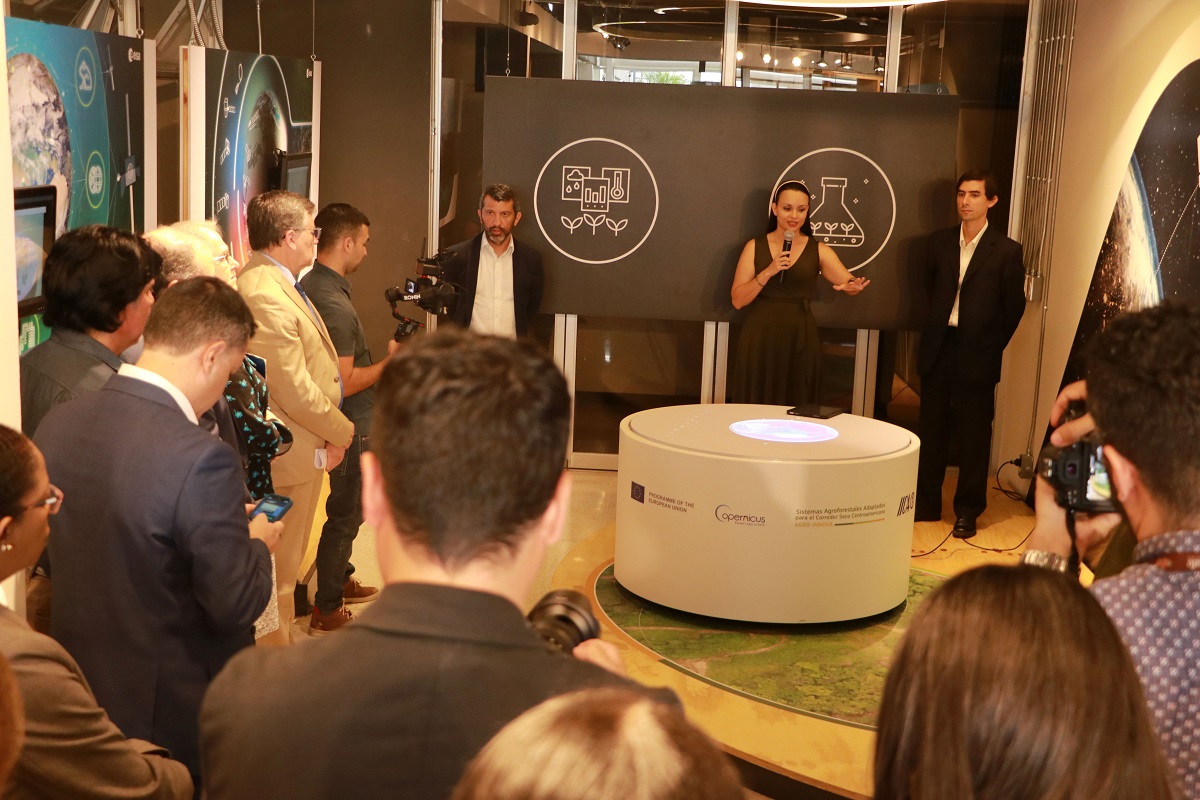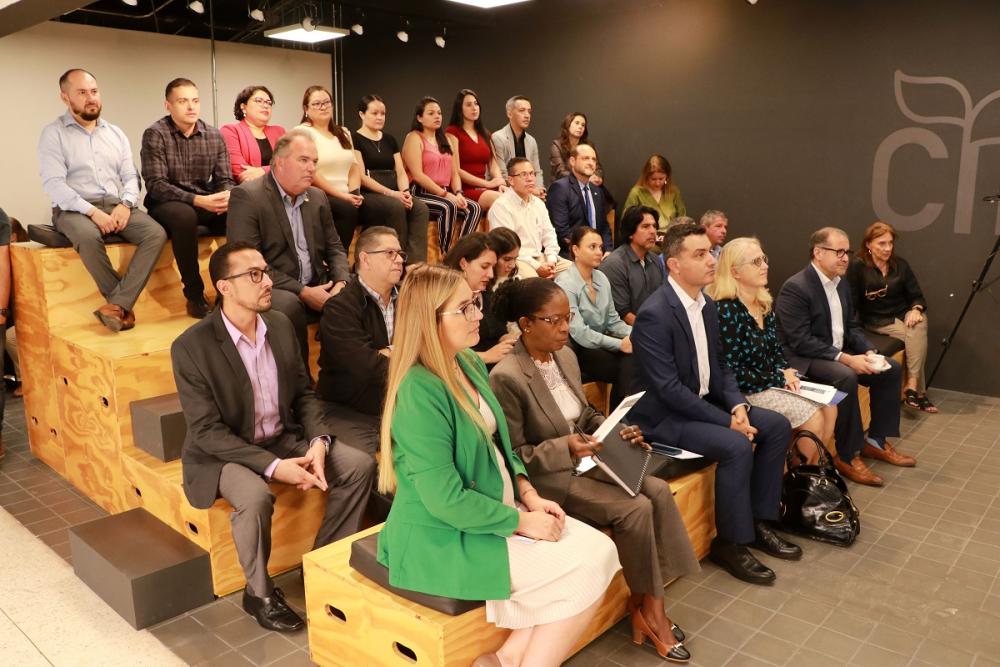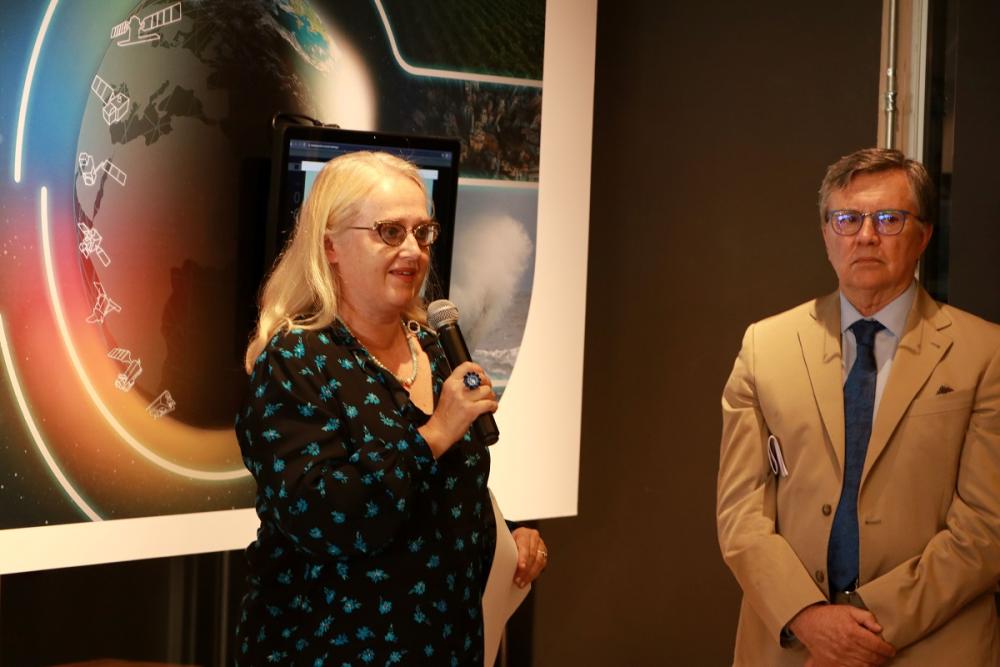The new exhibit was inaugurated at the Interpretive Center for Tomorrow’s Agriculture (CIMAG) at IICA Headquarters in Costa Rica – a public space that highlights the ways in which digital technologies are transforming agriculture in the hemisphere.

San Jose, 4 August 2023 (IICA)- Within the framework of the AGRO-INNOVA project, the European Union (EU) and the Inter-American Institute for Cooperation on Agriculture (IICA), inaugurated a stand that demonstrates the ways in which satellite-based digital tools can facilitate decision-making in the agriculture sector of the Americas, particularly with respect to climate adaptation and mitigation, productivity and food security.
The exhibit was inaugurated at the Interpretive Center for Tomorrow’s Agriculture (CIMAG) at IICA Headquarters in Costa Rica – a space that highlights the ways in which digital technologies can transform agrifood systems of the hemisphere and that seeks to reposition agriculture as a modern and profitable professional activity.
A part of the IICA of Open Doors initiative, CIMAG is open to the public.
The purpose of the stand is to showcase the potential of the tools and services that the Copernicus and Galileo programs offer for tropical agriculture in Central America and the Americas as a whole.
Decisionmakers from the public and private sectors, technical cooperation partners, academics, students and producers will be able to learn about digital solutions applied to agriculture and specific case studies that utilize remote sensing and georeferencing data from the Sentinel I and II satellites, generated via Copernicus and Galileo with information collected on the ground.

Participating in the virtual and in-person inauguration were Francois Roudié, EU Ambassador to El Salvador and SICA; Manuel Otero, Director General of IICA; Katja de Sedeleer, Head of Political Affairs and First Counsellor of the Delegation of the EU to Costa Rica; the IICA Representative in that country, Miguel Arvelo; and representatives of the Tropical Agricultural Research and Higher Education Center (CATIE) and of partner institutions involved in the AGRO-INNOVA project, such as the Coffee Institute of Costa Rica (ICAFE), the National Council of the 4S Clubs (CON-4S) and the National Chamber of Milk Producers (CNPL).
“Copernicus is an advanced Earth observation program that allows for viewing, from above, the scale of the impact of various activities on our planet. This allows for anticipating these impacts and making decisions based on science to foster better practices”, explained Roudié.
Manuel Otero, Director General of IICA, considered that the partnership between the Institute and the EU, which was established in 1991, has translated into projects that benefit agricultural producers across the hemisphere.
“At the exhibit, visitors will get an up-close look at the capacities of the digital solutions developed by the AGRO-INNOVA project, geared towards the analysis and monitoring of key indicators to improve agricultural and agroforestry activities in the Central American Dry Corridor”, stated Otero.
“We recognize the tremendous potential of Copernicus data for decision-making and monitoring in Costa Rican and Central American agriculture, which will allow for cementing the economic recovery of science, technology and innovation”, added Counsellor Katja de Sedeleer.
The exhibit showcases the first three applications developed for Central American tropical agriculture based on Copernicus and Galileo, within the framework of the AGRO-INNOVA project: a normalized difference vegetation index, a soil humidity and drought index, and an index for soil use in the Central American Dry Corridor.

Since 2019, the AGRO-INNOVA project, funded by the EU and executed by IICA, has been fostering sustainable development and poverty eradication in rural populations of the Central American Dry Corridor.
The project, which receives technical support from CATIE, also works to improve the climate resilience and food security of more than 3,500 small-scale farmers. Through the use of technologies in the production of staple crops and livestock farming, the initiative seeks to preserve biodiversity, increase productivity and improve the quality of life of highly vulnerable families in that region.
“This effort is geared precisely towards the 3,500 producers involved in the AGRO-INNOVA project in six countries. It is a very valuable tool that enables the Americas to demonstrate what can be done about environmental impacts”, stated Miguel Arvelo, IICA Chief of Staff and Representative of the Institute’s Delegation in Costa Rica.
Gustavo Jiménez, Executive Director of ICAFE, stressed the importance of democratizing and expanding access to the information provided by the Copernicus and Galileo programs. Robin Almendares, Executive Director of CONAC 4S, and Carlos Salazar, Technical Manager of CNPL, agreed that the technical assistance of IICA and other institutions will allow for better capitalizing on digital applications on producers’ farms.
Video in Spanish
More information:
Institutional Communication Division.
comunicacion.institucional@iica.int











